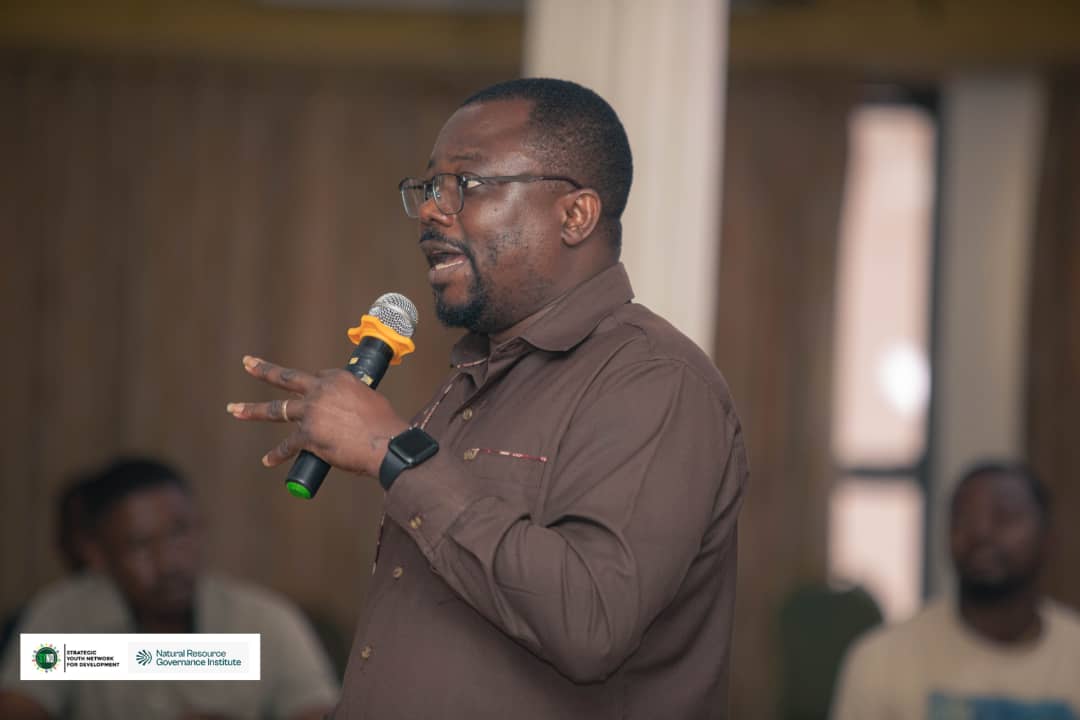
Dr. Robert Sogbadji
Story by: Ishmael Barfi
The Energy Ministry has urged young people to position themselves to tap into the government’s commitment towards the attainment of its Nationally Determined Contributions (NDCs) under the country’s Energy Transition Framework (2022-2070).
This the Ministry will harness the skills, development, and well-being of the citizenry, especially the youthful population.
According to the Energy Ministry, Ghana is on course to achieve its National Energy Transition plan to achieve the net zero agenda which will open up new job opportunities and other benefits to harness the youthful human resource of the country
Dr. Robert B.M Sogbadji, a representative of the Energy Ministry made this known at the Youth Participation in Energy Transition Conference organised by the Strategic Youth Network for Development (SYND) on Thursday, 18th August, 2023 in Accra.

One of the young participant doing a presentation
The conference brought young people in the Climate/Energy space to interact as well as be abreast with government policies towards the country’s National Energy Transition Framework (2022-2070).
The Framework presents a set of long-term policy recommendations to help Ghana achieve its Nationally Determined Contributions (NDCs) commitment by decarbonizing the energy sector and reaching net-zero emissions by 2070 while ensuring socio-economic growth and using Ghana’s natural resources.
In his presentation, Dr. Robert Sogbadji explained that, the National Energy Transition plan aims to identify viable pathways for the country to transition towards carbon-neutrality within a secure and efficient energy sector.
In addition, to harness the opportunity for a fair and equitable energy transition as the country relies on carbon intensive industries for economic growth.

Group picture of participants & Dr. Robert Sogbadji
And to evaluate the impacts of energy transition on the economy hence infrastructure, government revenues, jobs and social development as well as develop medium to long term targets and policies to develop a carbon-neutral economy.
To him, Ghana stands to benefit immensely from the National Energy Transition plan when the above-mentioned are realized
Some of benefits he noted was diversity in the energy supply mix, opportunity to commercialize the renewable energy carbon credit.
The rest are improvement in air quality and health, contribute to the reduction of cost of energy in the long term as well as creation of new job opportunities.
Breaking down the numerous benefits, Dr. Robert Sogbadji who is also a leading expert in Nuclear physics and renewable energy indicated that, economically, revenues and contributions to the country’s GDP will increase as projected Net Cash flows for Oil & Gas is US 35 Billion and US 1. 5 billion respectively whiles electricity sales is projected to US 140 billion (16% GDP) by 2070.
To the above, the Energy Ministry Representative emphasized that, access to funding for renewable energy projects will be more accessible in the future.

Dr. Robert Sogbadji delivering his presentation
Adding that, the creating traction by initially self-funding Renewable Energy and clean technologies could attract more funding.
For energy access and security, he was of the view that, there will be a universal access to electricity and high access to modern cooking fuels as well as increase in industrial and socio-economic development.
With universal electrification, he believes that, household will have access to electricity for other productive uses such as running cold stores, hairdressing saloons, dressmaking and local eateries.
For jobs, the transition he noted will have positive implication with a break down of fuel: 36,808 and electricity 1.4 million totaling 1.405 million.
Touching on social impacts, the explainded that, there will be an improvement in access to energy both for cooking and for lighting which he believes would lead to a total avoided time of 30.05 million hours for firewood collection.

Some young participants at the conference
On health, the reduction in fine particulate he acknowledged will prolong the lives of people in communities.
“Minimizing energy -related indoor air pollution could avoid 48,218 number of premature deaths”, he reiterated.
Policies towards achieving Net Zero under the National Energy Transition Framework he outlined in his presentation are as follow: Ghana government emitting industries shakl be required to establish tree plantation to offset emission, natural Gas shall be a transition fuel for electricity production, industrial heating and transport.
In furtherance, aggressively promote afforestation as carbon sinks, establishment of a regulatory framework to minimize Ghana government emission from industries, legislate and develop rules for carbon finance and trade, promote and encourage non-motorized transportation.
In addition, encouraging innovation in renewable technologies, expedite Oil and Gas exploration and production to fund development of clean energy technologies, expand Gas infrastructure to ensure reliable and adequate supply for gas, power and non-power uses as well as promote and encourage the use of LPG to reduce dependency in wood fuel.
There was a break up session where the young participants deliberated on issues relating to Energy transition and how they can contribute to the attainment as well as benefit from Ghana’s National Energy Transition Framework.
Source: www.thenewindependentonline.com








